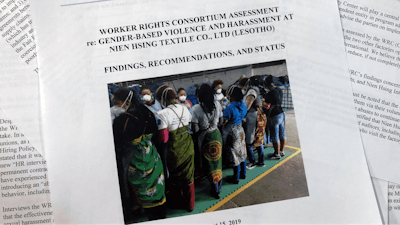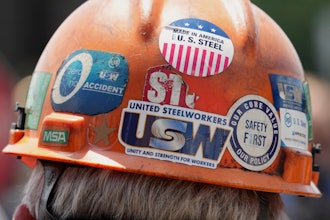
Women sewing blue jeans for Levi's, Wrangler, Lee and The Children's Place faced sexual harassment and gender-based violence and some were coerced into having sex with supervisors to keep their jobs in African factories, labor rights groups say.
In response to the revelations, the brands have agreed to bring in outside oversight and enforcement for more than 10,000 workers at five Lesotho factories, according to a report from the Washington-based Worker Rights Consortium released on Thursday.
The labor rights group investigated Taiwan-based Nien Hsing Textile factories in Lesotho — a poor, mountainous kingdom encircled by South Africa — after hearing from a number of sources that women who sew, sand, wash and add rivets to blue jeans and other clothes were facing gender-based violence.
Managers and supervisors forced many female workers into sexual relationships in exchange for job security or promotions, the report says. In dozens of interviews, the women described a pattern of abuse and harassment, including inappropriate touching, sexual demands and crude comments.
When the workers objected, they faced discrimination and retaliation, the report says. The factory managers also fought union organizing, it says.
While most of the employees are from Lesotho, managers were both locals and foreign. And female workers told investigators even male colleagues were molesting them.
"Male workers like touching females in a way that is not appropriate," one worker said.
"The foreign national managers slap women's buttocks and touch their breasts. They sometimes take them home for sex," another worker said.
Their testimony in the report is anonymous to protect their privacy.
Levi Strauss & Co. vice president of sustainability Michael Kobori said as soon as the company received the Worker Rights Consortium report it told Nien Hsing "that this would not be tolerated and required them to develop a corrective action plan." A spokesperson for The Children's Place said it informed the firm that their ongoing relationship "depends on effectuating significant and sustained changes."
Levi's, The Children's Place and Kontoor Brands, maker of Wrangler and Lee jeans, said in a joint statement they want all workers, especially women, to feel "safe, valued and empowered."
The U.S. companies are funding a two-year program, in collaboration with the U.S. Agency for International Development, that establishes an independent investigative group where factory workers can raise concerns.
Factory owner Nien Hsing has agreed to work with Lesotho-based unions and women's rights organizations to develop a code of conduct and enforcement actions.
"We strive to ensure a safe and secure workplace for all workers in our factories," Nien Hsing Chairman Richard Chen said in a written statement.
Besides its mills and manufacturing facilities in Lesotho, the company also has facilities in Mexico, Taiwan and Vietnam.
About 80 percent of garment makers around the world are women, according to the Global Fund for Women.
As awareness of sexual harassment and abuse has soared with the #MeToo movement in recent years, women's rights groups have pressured apparel makers in Asia to end gender-based violence.
The Global Fund has been working for several years in South Asia to improve workplace conditions at apparel makers in Bangladesh, Cambodia, India, Myanmar and Vietnam, teaching female garment workers about their workplace rights.
Rola Abimourched, a senior program director at the Worker Rights Consortium, said the Lesotho agreement should serve as a model for the rest of the apparel industry to prevent abuse and harassment.
"Hopefully this is something others will see and build on, so we can collectively make an impact far beyond any single country," she said.






















